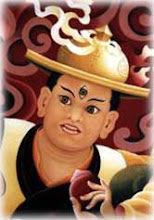 |
The romantic image of the Dalai Lama
as Spiritual Leader - a holy man in robes |
There are recent reports that the Dalai Lama's decision to retire from politics, expressed earlier this month, has been
accepted by the Tibetan Parliament. So does this mean that the Dalai Lama has really retired, and what are the implications for Dorje Shugden practitioners who are still experiencing discrimination at the hands of the Tibetan Government in Exile?
Time will tell. Perhaps the Dalai Lama has simply retreated into the background to create a 'democracy with 'Tibetan characteristics' (a continuing Theocracy) and from a practical point of view will continue to control all aspects of life for ordinary Tibetans, as has been the case for the past sixty years and beyond, or perhaps his decision heralds a new era of openness and true democracy with a genuine democratically-elected secular leader, the Kalon Tripa. The main question is - what will happen to religious freedom in this new system; will things be better or worse?
The hypocrisy of the Dalai Lama's 'non-sectarianism'
 |
The Dalai Lama's
words and actions
don't match |
Although the Dalai Lama has encouraged Tibetans to freely practice all traditions of Tibetan Buddhism and not to see any differences between them, a policy that heralds disaster for the future of Tibetan Buddhism and that is not even in accord with the Rime or non-sectarian movement of the last two centuries, he has been consistently hard on those who practise Dorje Shugden. To the Western world, the Dalai Lama proclaims that we should be respectful and open minded towards all faiths, even writing a
book on the subject, but, with characteristic hypocrisy, he has been less charitable towards the followers of Dorje Shugden, the main Protector practice of many powerful Gelugpa Teachers for four hundred years, and has preached anything other than peaceful co-existence. He has introduced an undemocratic ban on the practice, galvanising both Tibetans and Westerns to abandon the practice and ostracise those who refuse to give it up. Tibetans have had to swear an oath to do these two things, even in free, democratic countries such as Switzerland and the USA.
Ostracism and discrimination
 |
The unacceptable face of the
Dalai Lama's sectarian ban |
The ban has meant that Shugden practitioners are
denied basic rights, such the freedom to travel, enter certain shops and receive medical treatment and education. You can watch
Al Jazeera's unbiased report on this issue. It seems that Dorje Shugden has been the Dalai Lama's particular political obsession of the past thirty years, along with the problem of Tibet, but it has only ever been a means to an end, a smokescreen to distract from his failure to secure any autonomy for Tibet. Behind the scenes, he has tried to cement his position of holder of supreme spiritual and political power in Tibetan society while at the same time, showing a public face of tolerance, peace and compassion to the Western media. This policy of having two faces has served the Dalai Lama very well up to this point, but what does the future hold?
What is the Dalai Lama's role now?
 |
The Deification of the Dalai Lama
began with the political machinations
of the 'Great Fifth' |
Although loved by the Tibetan people and held to be a Buddha by Tibetan Buddhists, the Dalai Lama's role as a spiritual leader is completely unnecessary because each tradition of Tibetan Buddhism has its own Head, so what is his role? It seems that, over the past nearly four hundred years, the Dalai Lama has made himself indispensable to the Tibetan people, where they cannot think to do anything without his guidance. He built the Potala palace and made himself into a God-King. It's shocking to realise that the Dalai Lama has played the role of the cloying mother for four hundred years who, out of fear of redundancy, has refused to let her children grow up and stand on their own two feet. He has dictated Tibetan religio-political policy, creating the
'Lama Policy' that has poisoned Buddhism and threatened the pure teachings of Buddha Shakyamuni in this world, and he has used them to build a fortress of respectibility to the point where he is considered
one of the most influential people in the world by Time Magazine.
The future for Shugden practitioners
 |
The Shugden ban - largely ignored by the world's media
despite extensive protests worldwide |
What does the Dalai Lama's retirement from front line politics mean to Shugden practitioners who have been persecuted by him and his followers for the past thirty years? At this point, it's hard to say. It's hard to imagine that the Tibetan Government in Exile will immediately change their policy, given that it is clearly one of the Dalai Lama's most treasured, but maybe over time a true democracy and non-sectarianism will emerge if the Dalai Lama's influence is allowed to fade. The draconian ban of Shugden practice is clearly not a democratic policy but the heart aim of just one person, so there is every hope that things will change. However, in the meantime, as a 'spiritual leader'. the Dalai Lama will have more time on his hands and this doesn't bode well for Shugden followers as he will have many opportunities to speak out and further poison the hearts of Tibetans and Western followers of Tibetan Buddhism towards the practice and its devotees. It's hard to believe that he will stop following his long treasured aim of destroying the practice and only time will tell what this all means for true democracy and religious freedom.










1 comment:
This is an amazingly well put article, thank you. We will have to watch this space...
Post a Comment